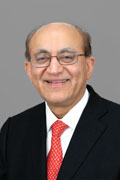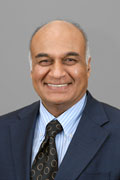Scientific Advisory Board
 | H. Robert Horvitz, PhD Chairman Dr. H. Robert Horvitz received the Nobel Prize in Physiology or Medicine in 2002. He is the David H. Koch Professor of Biology at the Massachusetts Institute of Technology; an Investigator of the Howard Hughes Medical Institute; Neurobiologist (Neurology) and Geneticist (Medicine) at the Massachusetts General Hospital; and a Member of the McGovern Institute for Brain Research and the MIT Center for Cancer Research. Dr. Horvitz received S.B. degrees in Mathematics and in Economics from the Massachusetts Institute of Technology and a PhD in molecular biology from Harvard University. Dr. Horvitz has served on many editorial boards, visiting committees and advisory committees, and has received numerous awards for his accomplishments. Dr. Horvitz was elected to the U.S. National Academy of Sciences in 1991, to the U.S. Institute of Medicine in 2003, to the American Philosophical Society in 2004, a Fellow of the American Academy of Arts and Sciences in 1994 and a Fellow of the American Academy of Microbiology in 1997. He has been a consultant to a number of pharmaceutical companies and was cofounder of the biotechnology companies NemaPharm, Inc. and Idun Pharmaceuticals. |
 | Sanjiv Sam Gambhir, PhD, MD
Dr. Sanjiv Sam Gambhir is a Professor of Radiology and Bioengineering at Stanford University. He is the Head of Nuclear Medicine and Director of the Molecular Imaging Program at Stanford (MIPS) (http://mips.stanford.edu) and member of the Bio-X program at Stanford University. He trained at the University of California Los Angeles (UCLA) in the Medical Scientist Training Program where he obtained both his M.D., and Ph.D. Dr. Gambhir has a translational science laboratory that focuses on multimodality molecular imaging including new probe development for positron emission tomography (PET) and optical imaging. His laboratory has developed methods to image gene expression in living subjects including humans. These imaging strategies have been translated into clinical trails for human gene/cell therapies. He has developed several small animal imaging strategies for studying basic cell/molecular biological events including imaging protein-protein interactions, intramolecular folding, and cell trafficking. Dr. Gambhir also has extensive experience with clinical FDG PET and developed many of the original management algorithms for cancer patients including cost-effectiveness models that led to FDG reimbursement by Medicare. He has received several awards including the Taplin Award (2002), Holst Medal (2003), the Academy of Molecular Imaging Basic Scientist Award (2004), the Society of Molecular Imaging Achievement Award (2004), the Distinguished Clinical Scientist Award from the Doris Duke Charitable Foundation (2004), the Hounsfield Medal for Imperial College London (2006), the Aebersold Award from Society of Nuclear Medicine (2006), and the Tesla Medal from the British Radiological Society (2008). He is a fellow of the American Institute for Medical and Biological Engineers (AIMBE) and a fellow of the American Society of Clinical Investigation (ASCI). He is one of 35 members of the National Cancer Institute (NCI) Scientific Advisory Board and also co-hosted the Nobel Symposium on Molecular Imaging in Stockholm in 2007. He serves as an advisor to over 10 imaging/biotechnology companies and is Associate Editor of several journals including the Journal of Nuclear Medicine and the journal Radiology. |
 | Rakesh Jain, PhD
Dr. Jain is regarded as a pioneer in the fields of tumor biology, drug delivery, in vivo imaging and bioengineering. He is known for revealing the physiological barriers to delivery and efficacy of anticancer drugs, for proposing strategies to overcome these barriers and for translating these strategies from bench to bedside. His work has fundamentally changed the thinking of scientists and clinicians about how molecularly targeted therapeutics, especially antiangiogenic agents, actually work in animal models and cancer patients, and how to combine them optimally with cytotoxic therapies to improve survival rates in cancer patients.
A mentor to more than 100 doctoral and postdoctoral students from over a dozen different disciplines, and a collaborator of over 100 clinicians and scientists worldwide, Dr. Jain's findings are summarized in more than 435 publications, including three in Scientific American. He serves on advisory panels to government, industry and academia, and is a member of editorial boards of ten journals, including Nature Reviews Cancer and Nature Clinical Practice Oncology. He received more than 30 major awards and lectureships, including a Guggenheim Fellowship (1983-1984), the Humboldt Senior Scientist Award (1990-1991), the National Cancer Institute's Research Career Development Award (1980-1985) and Outstanding Investigator Grant (1993-2000), the Academic Scientist of the Year Award from the Pharmaceutical Achievements Awards (2005) and the Distinguished Service Award from Nature Biotechnology (2006). He is a member of the Institute of Medicine (2003), the National Academy of Engineering (2005) and the American Academy of Arts and Sciences (2008). |
 | Raju Kucherlapati, PhD Scientific Advisory Board Member Dr. Raju Kucherlapati is a Professor of Medicine and the Paul C. Cabot Professor of Genetics at Harvard Medical School and the first Scientific Director of the Harvard-Partners Center for Genetics and Genomics. He received his Ph.D. from the University of Illinois at Urbana. He trained at Yale University and held faculty positions at Princeton University, University of Illinois College of Medicine, and the Albert Einstein College of Medicine. He served on the editorial board of the New England Journal of Medicine and was editor in chief of the journal Genomics. He is a fellow of the American Association for the Advancement of Science. Dr. Kucherlapati was a founder of Abgenix, Cell Genesys, and Millennium Pharmaceuticals and served on their Board of Directors. He is a member of the Board of the privately held AVEO Pharmaceuticals. |

